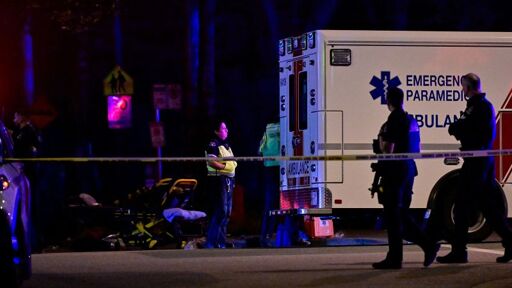- cross-posted to:
- fuckcars@lemmy.world
- cross-posted to:
- fuckcars@lemmy.world
A driver plowed a car into a crowd at a street festival celebrating Filipino heritage in Vancouver on Saturday night, killing at least nine people and injuring others.
Some of those attending the festival helped arrest the suspect at the scene, who police identified as a 30-year-old man.
…
“It’s something you don’t expect to see in your lifetime,” Kris Pangilinan, a Toronto-based journalist, told Canadian public broadcaster CBC. “[The driver] just slammed the pedal down and rammed into hundreds of people. It was like seeing a bowling ball hit — all the bowling pins and all the pins flying up in the air.”
He continued, “It was like a war zone… There were bodies all over the ground.”



Right here, right now, they can be compared to guns assuming this was an attack. Were it not for car-centric infrastructure, a car couldn’t even have reached this crowded festival. There would’ve been trivial safety measures like bollards in place, but because we as a society collectively value vroom vroom over human lives, they weren’t in place. With
nineeleven killed and twenty injured, it was comparable in devastation to a mass-shooting. Just like when the US values pew pew over human lives, there are mass-shootings.But you’re right: they aren’t the same.
By the way, “guns are made for killing” can just as easily be warped into “guns are made for self-protection”, and suddenly you can compare if their utility outweighs their ease of access and rampant deregulation – just like you can with cars.
Now give me the positive statistics. Cars save lives as well. Think of all the emergency vehicles that help people every day. I’m pretty sure guns are way less helpful.
Okay, let’s see here. If we put aside the climate change killing untold trillions of animals on top of the mass-extinction event, the untold number of humans that have died and will die from climate change, the number of people displaced by climate change, the over a million people killed annually, the few million injured annually (many permanently and debilitatingly), the billions of dollars in annual property damage, the regions destabilized and the hundreds of thousands killed and displaced over oil wars, the lung issues from air pollution and the brain damage from when it was leaded, the neighborhoods destroyed to make way for roads, the poverty in the inner city caused in large part by unsustainable suburban sprawl, the people bankrupted by the need to own a car, the opportunity cost from the money wasted on overpriced car infrastructure, the amount of hours wasted driving because of said sprawl, the contribution to the obesity epidemic by making people more sedentary, the disenfranchisement of the elderly, young, and disabled who can’t drive or would have a much easier time on public transit, that many of those emergency vehicles are responding to car crashes, that lower traffic and less sprawl via public transit and micromobility lowers response times for emergency vehicles (thus saving more lives), and if we totally disregard that emergency vehicles are more than capable of existing in a city built around public transit and micromobility (and much more that I’m forgetting)…
A rounding error in comparison. That your answer was “emergency vehicles” shows that you don’t understand the scope and scale of how badly car-centric infrastructure damages everything it touches. It isn’t on the same order of magnitude; it isn’t even within a few orders of magnitude. If anything, emergency vehicles have been hampered by the rampant proliferation and deregulation of cars, because it makes it harder for them to get to their destination quickly and safely.
Hell, half of the time I can’t move as quickly as I would like to through the city with my bicycle it is due to cars being in the way of moving quickly and efficiently. And that is a lot smaller than an ambulance.